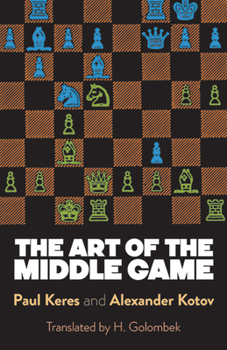The Art of the Middle Game
Select Format
Select Condition 
Book Overview
Superb guide to neglected area of chess. Two formidable grandmasters cover attacking the king, defense, importance of pawn structure, analysis, much more. Authoritative introduction by Harry Golombek. Belongs in the library of every serious chess enthusiast. Indexes of players and middle-game themes.
Format:Paperback
Language:English
ISBN:0486261549
ISBN13:9780486261546
Release Date:December 1989
Publisher:Dover Publications
Length:256 Pages
Weight:0.58 lbs.
Dimensions:0.5" x 5.4" x 8.2"
Customer Reviews
4 ratings
A Classic Middle Game Book!
Published by Thriftbooks.com User , 18 years ago
Written in descriptive notation (wish they would update it to algebraic, but since this book is written for Intermediate or or Advanced players, this should not be a biggie) 'Art of the Middlegame' will help you formulate a 'plan'. Actually written by several top notch Grandmasters taking on certain chapters, each one teaches what they consider to be important themes (ranging from defending a difficult position to strategy and tactics in attacking the King). Books that will go along well with this are those with complete games containing good middlegames (suggested: "Unbeatable Chess lessons for Juniors", "More Unbeatable Chess" and "Understanding Chess, move by move" - for advanced players). Conclusion: If you are rated 1500+, want to improve your ability to plan, and don't mind descriptive notation "The Art of the Middle Game" would make an excellent choice.
SO YOU WANT TO IMPROVE YOUR MIDDLEGAME?
Published by Thriftbooks.com User , 22 years ago
Then this is the book for you! Be prepared to do more than read this book. The ideas it plants in your chess brain are the seeds of future success. Keres, with Kotov, two great players of the past have put to paper chess lessons for the ages. Don't worry about the descriptive notation, if you can figure out 12 moves of some obscure King's Indian line then you can master an old way to record moves. Keres' section on defending difficult positions is worth the price of the book alone. Add in his section on the art of analysis and we have a true winner. Granted, adjoured games have gone the way of the wind in many cases but this is still good fertile ground for the correspondence player and for over the board tournament players because it goes into how to assess a position and the ramifications of your decision. Read the book and you will never look at one of your games the same way. Kotov's sections are good too but they are just a bonus for a book that doesn't cost much but is full of instruction and in how a great Grandmaster (Keres) thinks.
A note on content.
Published by Thriftbooks.com User , 23 years ago
This is a breif review of what this book contains and how usefull it will be to various players. It is writen in descriptive notation (i.e. P-K4), which is difficult to muddle through in our modern, algebraic world, but wonderful fruits will flow from its examination.Part one is relatively simple, concerning itself with basic planning and the attack on the king in various positions. (Another excellent book on this is 'Art of Attack in Chess' by Vladmir Vukovic in algebraic notation, which is considerably larger.)Part two is more complex, discussing how to defend difficult positions and pawn configurations in the center. Keres' section on defence is, relatively speaking, a masterpiece and contains many ideas that are virtually indispensible. The section on pawns is also very informative though not exhaustive on the role of pawns. (Hans Kmooch's book 'Pawn Power in Chess' is certainly more in-depth concerning pawn positions that cover the entire board, but it has the special detraction of being almost incomprehensible due to its excessive complexity and needless terminology.)Finally, part three is generally for the more advanced player. Called 'The Art of Analysis', it concerns mental computation in conjunction with written variations (particularly concerning the endgame). Not for the weak of heart, this section would probably intimidate most novices because the numerous variations often stretch to 20 moves or more. That is not to say that it isn't valuable - on the contrary, this section provides valuable study by any player of any strength, but only relatively strong players will reap the fullest benifits of its study.
Chapters by Keres outstanding
Published by Thriftbooks.com User , 24 years ago
The chapters by Kotov on attacking the king and pawn structures aren't bad. In particular, he covers attack in a way I've seen no other author do. The chapters by Keres on defending difficult positions and the art of analysis are phenomenally good. The chapter on analysis examines minutely half a dozen adjourned positions. I have to admit I have found errors here and there,in sub-lines, using Fritz. What is staggering is there are so few errors. The first adjourned position, against a player by the name of Szapiel, takes up twenty pages. Keres brings to light the subtleties and finesses involved in an ostensibly simple position. A salutory reminder to every chessplayer to look below the surface.Buy the book if you don't already have it. My gratitude to Dover for keeping the book in print.





